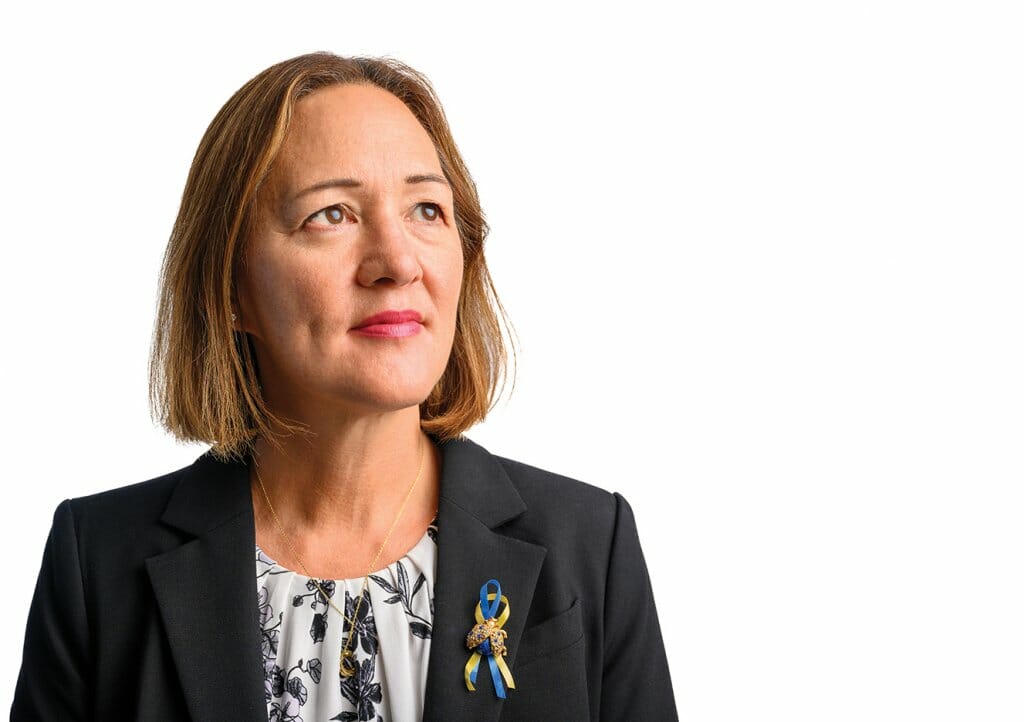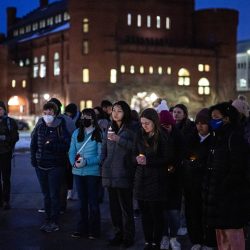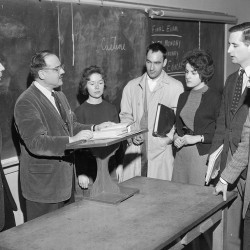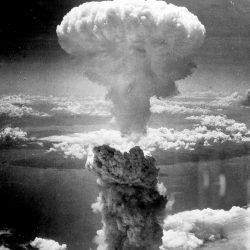A Fiery War with Russia
Political science professor Yoshiko Herrera believes Ukrainians’ resolve for statehood will prevail.

Herrera: “For decades to come Russia will be a pariah state, possibly facing charges of war crimes and genocide, and its economy will be seriously damaged.”
Yoshiko Herrera was earning her undergraduate degree at Dartmouth as the Berlin Wall came tumbling down and the Soviet Union faced dissolution. After a study-abroad visit to Eastern Europe in 1990 and a peek behind the crumbling Iron Curtain, Herrera switched academic tracks to study the “different world” she saw and the ethnic, national, and social groups within it. Now she’s an expert in Russian politics and a professor of political science at the UW, and the war in Ukraine has given her yet another post-Soviet conflict to study. Since Russia invaded Ukraine on February 24, Herrera has done countless interviews for local and national news outlets to explain Russian president Vladimir Putin’s destructive actions and why she believes Ukrainians’ resolve for statehood will eventually prevail.
At the start of the invasion of Ukraine, you called Putin’s actions an “incredible miscalculation.” What did Putin miscalculate?
It’s a miscalculation based on a profound misunderstanding of Ukraine and a significant underestimation of the international reaction in terms of sanctions and military support for Ukraine. The lack of respect for sovereignty and nationhood in Ukraine led Putin and his military advisers to not seriously examine the situation, including assessing Ukraine’s likely resolve, military capabilities, and lack of support for a Russian occupation. Because the 2014 Crimea invasion was such a shock for Ukraine, Ukrainians realized the danger to their state and nation, and they largely got over some of their historic differences and built a more inclusive sense of Ukrainian national identity that’s not just based on ethnic or linguistic traits.
What are the consequences that Putin, and Russia more broadly, have faced?
Even if Ukraine doesn’t join NATO per se, it is going to remain strongly anti-Russian, which is the opposite of what Putin wanted. Plus, Finland and Sweden are now on track to join NATO. And every other country in Europe has been put on alert that Russia is a dangerous country, and they need to treat it as such. In many ways the results for Russia have been disastrous. Regardless of the outcome of the war, for decades to come Russia will be a pariah state, possibly facing charges of war crimes and genocide, and its economy will be seriously damaged. Ironically, a military defeat of Russia and Putin may be the best hope that Russia has to improve its prospects. But I want to emphasize the war has been a terrible, unprovoked, humanitarian and economic catastrophe for Ukraine.
How do you see this war ending? Do you expect to see peace anytime soon?
Right now, nobody really knows how long this can last. Unfortunately, I think both sides are very committed to fighting, so I don’t really see the prospect of a ceasefire or any negotiated settlement anytime soon. Ukrainians will not give up their state. The only question is to what extent they will be able to beat back Russian forces. On the Russian side, we see that there is no limit to Putin’s cruelty.
What do you believe is the United States’ role in this conflict?
Number one is in the coordination of international economic sanctions, especially with Europe, against Russia. There is more to be done on energy sanctions, and the U.S. should keep pressing on further secondary sanctions. Even though sanctions are not going to have an immediate effect on the war, they are going to weaken Russian state capacity and capabilities over the next few months or year.
Second is military support and weapons supply, and the U.S. is doing a lot, but Ukraine needs more help on this, and the U.S. should lead the way. There are a lot of reasons why Western governments might not be advertising everything they’re doing — I tend to be of the view that there is a lot going on behind the scenes that we are not aware of — but the military support from the West is absolutely critical to helping Ukraine win.
Humanitarian support for people in Ukraine, as well as displaced people, is important. There is also a major role for Europe and the U.S. in terms of supporting the rebuilding process in Ukraine. The world needs to hold Russia to account in terms of war crimes.
How should the United States navigate future relations with Russia?
As long as Putin is in power, we have to deal with a threatening, malevolent, untrustworthy government. There is no building trust with an untrustworthy regime, and hence the U.S. and Europe will have to act accordingly. One thing that is likely to change is that there has to be a long-term reconsideration of energy policy generally to [take] into account both the environment and these national security issues. Given the Russian threat, it is more important than ever that the U.S. have a coordinated national security policy with a reliable executive in the Oval Office.
Published in the Fall 2022 issue



Comments
No comments posted yet.